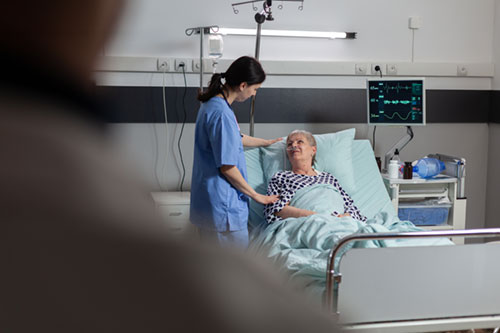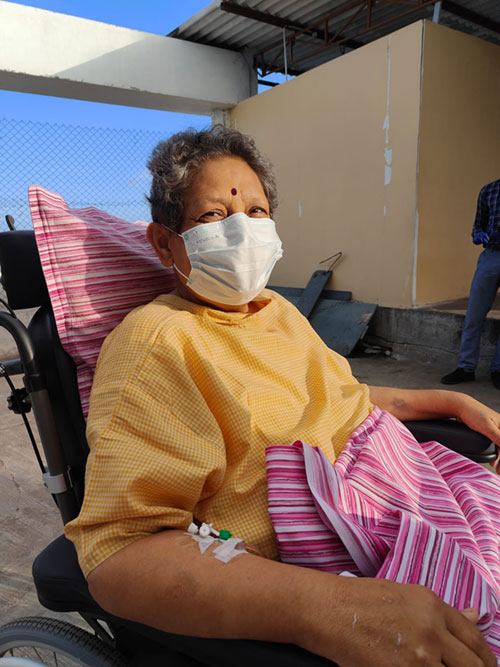The care of elderly patients in the ICU requires special attention due to their unique physiological and psychological needs. This article aims to provide an overview of some of the common problems that bring this group to the intensive care unit and how to minimise the risk of these incidents.

Trauma
Long bone fractures, hip injuries, spine fractures and head injuries are some of the reasons the elderly are brought to the ICU. Intrinsic factors such as muscle weakness, peripheral neuropathy, gait and balance issues in addition to environmental hazards lead to a higher risk of falls.
Surgery is warranted for some of these injuries. Bleeding and anaesthesia risks are important considerations in this group as a result of underlying medical conditions and side effects of certain medications such as blood thinners. High-risk individuals may require an overnight stay in the ICU for observation.
A multi-disciplinary team approach including a rehabilitation therapist is exerted to reduce hospital stay and enable these patients to transition to their routine smoothly.
Fever and Sepsis
Bacteremia presentation may be more subtle in older patients with a lower likelihood of chills, sweating and fever, warranting hospitalisation and cultures when sepsis is suspected in the setting of tachycardia and hypotension and non-specific symptoms such as anorexia and increased confusion.
Gastrointestinal and genitourinary sources are more common in older adults. Nosocomial bacteraemia is highly associated with the presence of invasive devices such as intravenous cannula or urinary catheters. Older adults have a 5-fold risk of infective endocarditis (infection in the valves of the heart). Low threshold of suspicion followed by a prompt TEE/TTE is warranted.
The diagnosis may be difficult and may be delayed due to atypical clinical presentation and the absence of classic signs and symptoms. Isolation of the infection and appropriate treatment followed by early weaning of medical supports help reduce critical illness-related complications such as muscle wasting, hospital acquired infections and delirium.
Organ Dysfunction

Heart failure or renal failure can result in fluid overload causing breathlessness which may necessitate intensive care. Immediate organ support such as non-invasive/ invasive ventilation with oxygen and stabilisation of hemodynamics followed by an assessment of the extent of organ dysfunction (be it the progression of underlying disease or a new onset dysfunction such as an acute coronary event) along with close monitoring guides further management to limit disability.
Valvular dysfunction and arrhythmias increase the risk of vascular events like stroke. Early remedies to limit damage and minimise such risks help reduce morbidity and mortality. Treatment and procedures are individualized to each person based on their clinical status and associated risks, quality of life and personal values. This results in adherence to treatment, regular follow-up and a continuum of wholesome care.
Adverse Drug Events (ADE)
Polypharmacy is the utilization of many medicines in a way that is not considered to be appropriate. As older adults have more health conditions than young people, polypharmacy is something they need to be aware of. Use of multiple drugs has been separately connected with a higher risk for an ADE, hospitalization and reduced physical and mental abilities.
It also escalates the probability of prescribing cascades wherein ADE is misunderstood to be a new disease and extra medicines are started.
Bleeding, drowsiness, movement disorders, hyperglycemia/hypoglycemia, renal dysfunction and electrolyte imbalances are some of the ADEs that result in hospitalisation in the ICU.
Common offending drugs are diuretics, antipsychotics, blood thinners, ACE inhibitors and insulin. Identifying the event and causative agent helps modify and calibrate the offending medication.
Acute Confusional State – Delirium
In attention and fluctuations in consciousness characterize delirium. This can either be the cause of hospitalisation (in case of infection, malnutrition, dehydration, adverse drug events or new organ dysfunction) or can occur as a result of it (such as pain, sleep deprivation and drugs). The elderly are prone to delirium. Prompt and swift identification of the cause followed by appropriate treatment, early mobilisation and return to routine, aid in greatly reducing further impairment.
Malnutrition
Depression and cancer are the 2 most prevalent conditions associated with reduced dietary intake. Sarcopenia adds to the disability that ensues. Hospitalised older patients may be afflicted by impaired cognition, poor appetite, restriction of movement and difficulty in self-feeding. Simple interventions such as getting out of the bed to a chair and feeding with assistance can improve nutritional intake. In addition, assessment by a nutritionist to identify nutritional deficiencies and follow-up in the community can ensure set targets. Restricted diets are to be avoided in the elderly which may further limit their nutritional intake.
The care of elderly patients in the ICU requires a proactive and tailored approach. Comprehensive geriatric assessment, medication management, early rehabilitation, prevention and management of delirium, proper communication with family and discussing goals of care along with a multi-disciplinary collaboration between the critical care physicians, geriatricians, nurses, pharmacists and therapists is crucial in providing comprehensive care to the elderly.
Prevention is always better than cure. To help avoid elderly individuals needing to come to the ICU, it is important to focus on the following:
- Proper management strategies that include regular checkups & screening, and effective management of the underlying diseases (diabetes, hypertension and heart disease).
- Fall prevention (removing hazards, using assistive devices like canes, etc.).
- Regular vaccinations & medication review (avoid polypharmacy).
- Smooth care transition from ICU/ward to their home or care facilities with effective communication between health care providers and caregivers helps prevent readmission to the ICU.
Despite all preventive measures, there may be instances where ICU admission is necessary. Proper care and attention in the ICU can help optimise outcomes and help in a swift return to normalcy.

Dr. Shuba Hariprasad
Consultant Critical Care Specialist,
Kauvery Hospital Chennai

